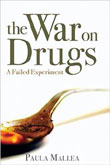Our Leaders Must Tell Us the Truth About the Pandemic
Brandon Sun, May 25, 2020 – David
McConkey
“Now this is not the end. It is not
even the beginning of the end. But it is, perhaps, the end of the
beginning.”
Those words from Winston Churchill in 1942 could apply to the
coronavirus pandemic today. The pandemic will be with us for a long
time; we need our political leaders to be candid about the best ways
to deal with it. But given our leaders’ response to another major
health emergency, the illicit use of dangerous drugs, we should be
worried.
Even though all the news right now is about the pandemic, let’s remember how big the drug problem is. Many lives are ruined or lost in Canada because of the illicit use of dangerous drugs, like opioids, fentanyl, meth and heroin.
“About 12 people die every day from an opioid-related overdose,” Jane Philpott wrote in a recent opinion piece in Maclean’s magazine. “This is a national public health emergency.” Philpott knows. A medical doctor, she recently served as federal Minister of Health. Writing just before the coronavirus pandemic hit, Philpott noted the opioid crisis was “Canada’s most significant public health threat since 1919, when 55,000 people died from the Spanish flu.”
For decades, politicians of all parties have endorsed the War on Drugs. But this war has been a costly human disaster: dangerous illicit drugs are today more available than ever.
Instead, solutions will be in “harm reduction.” In this case, harm reduction starts with admitting the War on Drugs has failed and then involves measures like setting up safe drug injection sites and decriminalizing or legalizing all drugs. “Harm reduction” sounds less than ideal – it is and that is the point. Think of harm reduction like “making the best of a bad situation” or like “choosing the lesser of two evils.”
Politicians know that the drug war has failed and we need new approaches, but they won’t be honest and tell us that. How do we know? Because politicians tell us so, after they leave office or in unguarded moments.
For example, both the Manitoba Progressive Conservative government and the opposition NDP have in effect admitted they privately know that safe injection sites are a good idea. But they are afraid to be honest and publicly say so. The NDP waited until they were safely out of office before they openly recommended injection sites. The Conservatives released a report in 2018 that included injection sites. Oops! Hours later, the report was recalled and changed. Whew! That was close!
Like the drug crisis, we will face uncomfortable choices dealing with the pandemic. Should we develop “herd immunity” when there is no vaccine nor treatment? Do we send children back to school? Make masks compulsory? Open or close businesses? I don't know the answers, but I am concerned that political leaders will not be honest with us, especially when there is a need to admit mistakes were made and to acknowledge the necessity for a new direction.
This criticism does not diminish the enormous challenge in which we find ourselves. The coronavirus was unexpected. No one knew for sure what the best course of action was. Measures were taken to “flatten the curve” (a phrase we had not even heard before) to avoid possible mass death and crashing of health-care systems.
But we are moving into the next stage of the pandemic, which requires a higher level of humility and honesty. Our leaders should admit that the best we can hope for is harm reduction. And our leaders should admit that we can learn from elsewhere, like from small, innovative countries in Europe. We Canadians are so fixated on the United States that we ignore other places. Right now, for example, Sweden could be a model for how to handle the pandemic.
Let’s return to the Philpott opinion piece in Maclean’s. What is her prescription for Canada to deal with dangerous illicit drugs? Canada should decriminalize all drugs, she writes, as has been done with success in Portugal. And Canada should legalize drugs like heroin for dispensing to those addicted, as has been done with success in Switzerland.
“Decriminalization sounds radical but it‘s the sensible approach,” Philpott concludes. Criminalizing drug users “has been a complete failure.” Too bad she did not tell us the truth when she was health minister!
The coronavirus pandemic challenges our political leaders to demonstrate an extraordinary level not just of competence, but also of candor. For years, our leaders have bungled and have not told us the truth about the drug health emergency. When it comes to confronting the pandemic health emergency, we citizens must demand that our leaders tell us the truth.
Even though all the news right now is about the pandemic, let’s remember how big the drug problem is. Many lives are ruined or lost in Canada because of the illicit use of dangerous drugs, like opioids, fentanyl, meth and heroin.
“About 12 people die every day from an opioid-related overdose,” Jane Philpott wrote in a recent opinion piece in Maclean’s magazine. “This is a national public health emergency.” Philpott knows. A medical doctor, she recently served as federal Minister of Health. Writing just before the coronavirus pandemic hit, Philpott noted the opioid crisis was “Canada’s most significant public health threat since 1919, when 55,000 people died from the Spanish flu.”
For decades, politicians of all parties have endorsed the War on Drugs. But this war has been a costly human disaster: dangerous illicit drugs are today more available than ever.
Instead, solutions will be in “harm reduction.” In this case, harm reduction starts with admitting the War on Drugs has failed and then involves measures like setting up safe drug injection sites and decriminalizing or legalizing all drugs. “Harm reduction” sounds less than ideal – it is and that is the point. Think of harm reduction like “making the best of a bad situation” or like “choosing the lesser of two evils.”
Politicians know that the drug war has failed and we need new approaches, but they won’t be honest and tell us that. How do we know? Because politicians tell us so, after they leave office or in unguarded moments.
For example, both the Manitoba Progressive Conservative government and the opposition NDP have in effect admitted they privately know that safe injection sites are a good idea. But they are afraid to be honest and publicly say so. The NDP waited until they were safely out of office before they openly recommended injection sites. The Conservatives released a report in 2018 that included injection sites. Oops! Hours later, the report was recalled and changed. Whew! That was close!
Like the drug crisis, we will face uncomfortable choices dealing with the pandemic. Should we develop “herd immunity” when there is no vaccine nor treatment? Do we send children back to school? Make masks compulsory? Open or close businesses? I don't know the answers, but I am concerned that political leaders will not be honest with us, especially when there is a need to admit mistakes were made and to acknowledge the necessity for a new direction.
This criticism does not diminish the enormous challenge in which we find ourselves. The coronavirus was unexpected. No one knew for sure what the best course of action was. Measures were taken to “flatten the curve” (a phrase we had not even heard before) to avoid possible mass death and crashing of health-care systems.
But we are moving into the next stage of the pandemic, which requires a higher level of humility and honesty. Our leaders should admit that the best we can hope for is harm reduction. And our leaders should admit that we can learn from elsewhere, like from small, innovative countries in Europe. We Canadians are so fixated on the United States that we ignore other places. Right now, for example, Sweden could be a model for how to handle the pandemic.
Let’s return to the Philpott opinion piece in Maclean’s. What is her prescription for Canada to deal with dangerous illicit drugs? Canada should decriminalize all drugs, she writes, as has been done with success in Portugal. And Canada should legalize drugs like heroin for dispensing to those addicted, as has been done with success in Switzerland.
“Decriminalization sounds radical but it‘s the sensible approach,” Philpott concludes. Criminalizing drug users “has been a complete failure.” Too bad she did not tell us the truth when she was health minister!
The coronavirus pandemic challenges our political leaders to demonstrate an extraordinary level not just of competence, but also of candor. For years, our leaders have bungled and have not told us the truth about the drug health emergency. When it comes to confronting the pandemic health emergency, we citizens must demand that our leaders tell us the truth.
* *
* *
See also: Drug Policies Require More Humility, Less Virtue Signaling
Reflecting on Big Questions
Telling the Truth Today
Reflections on the War on Drugs
War on Drugs No Easy Battle
Enlightenment Values Are Needed Now More Than Ever
QUICK CONTACT:
David McConkey,
Brandon, Manitoba
Send me an email
My Sites / Interests
- Citizen Active
- Columns
- The Great War
- Live Well, Do Good
- Manitoba History
- Obituary Guide
- Reviews
- The War on Drugs
Some Reviewed Books:
The War on Drugs:
A Failed Experiment

The Atheist Muslim:
A Journey from Religion to Reason

Stranger Than We Can Imagine:
An Alternative History of the 20th Century
Heretic:
Why Islam Needs a Reformation Now
Islam and the Future of Tolerance:
A Dialogue

Extraordinary Canadians:
Nellie McClung

The Greatest Show on Earth:
The Evidence for Evolution



